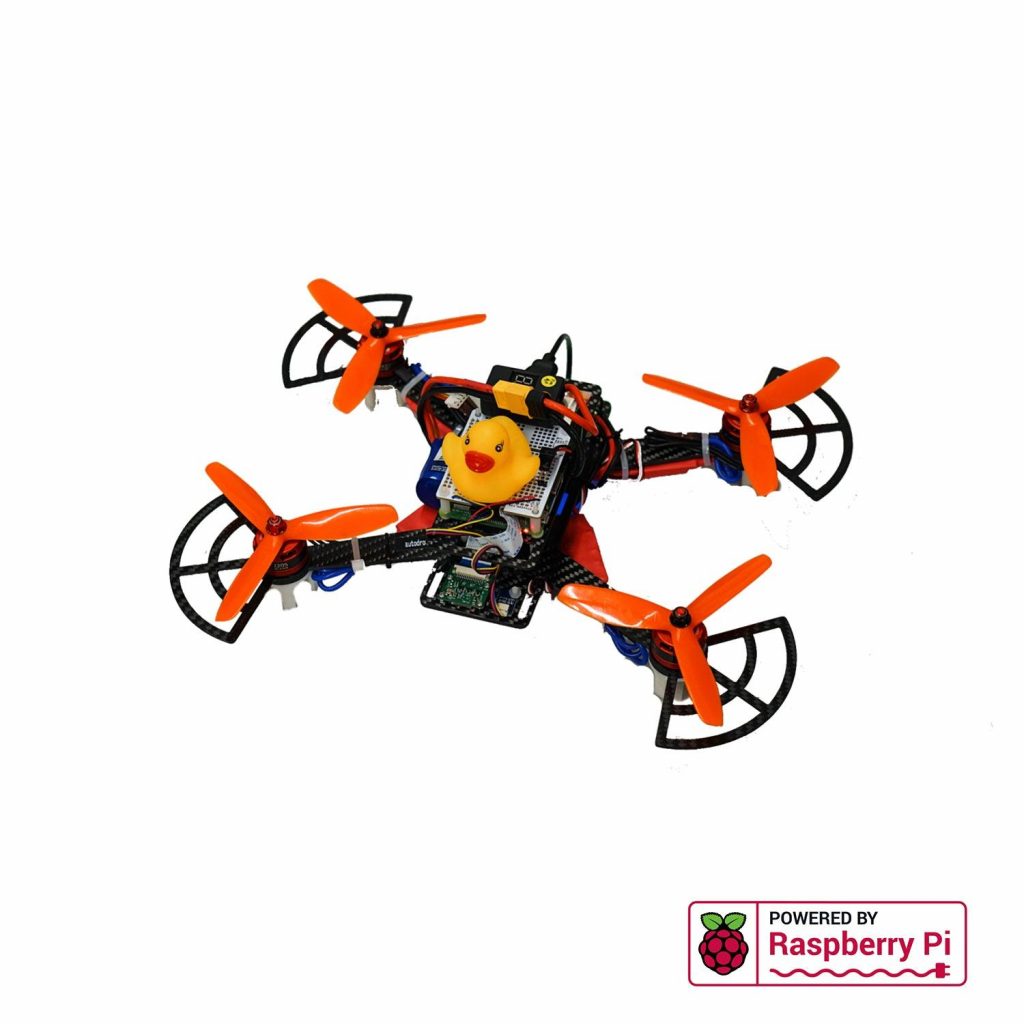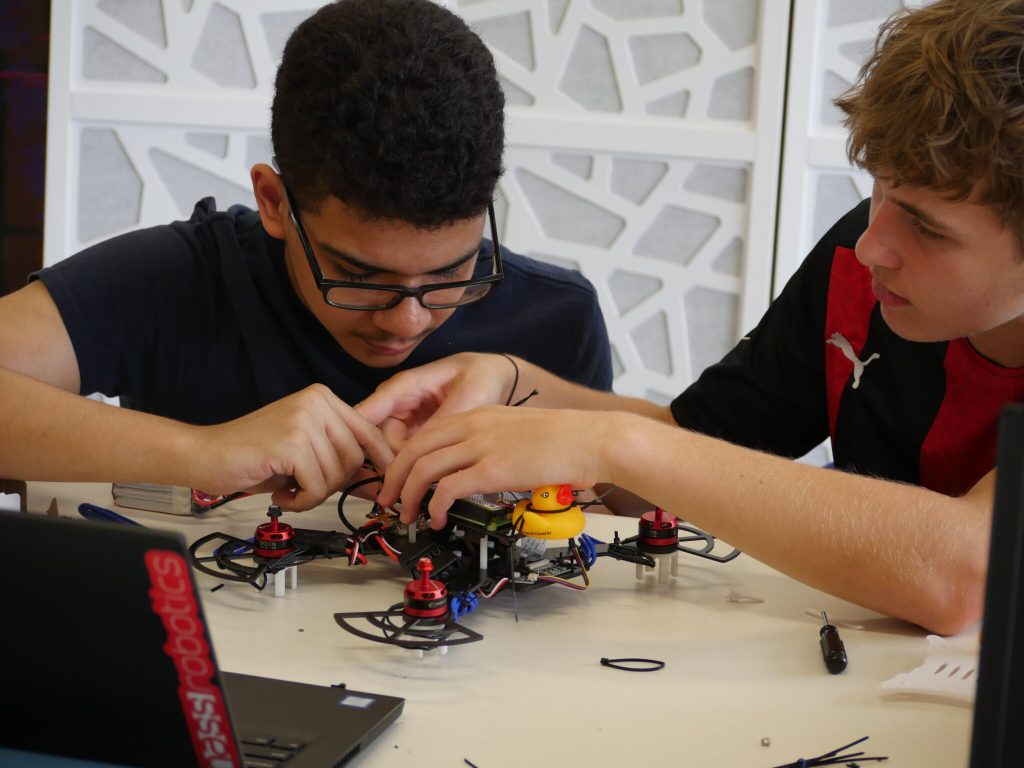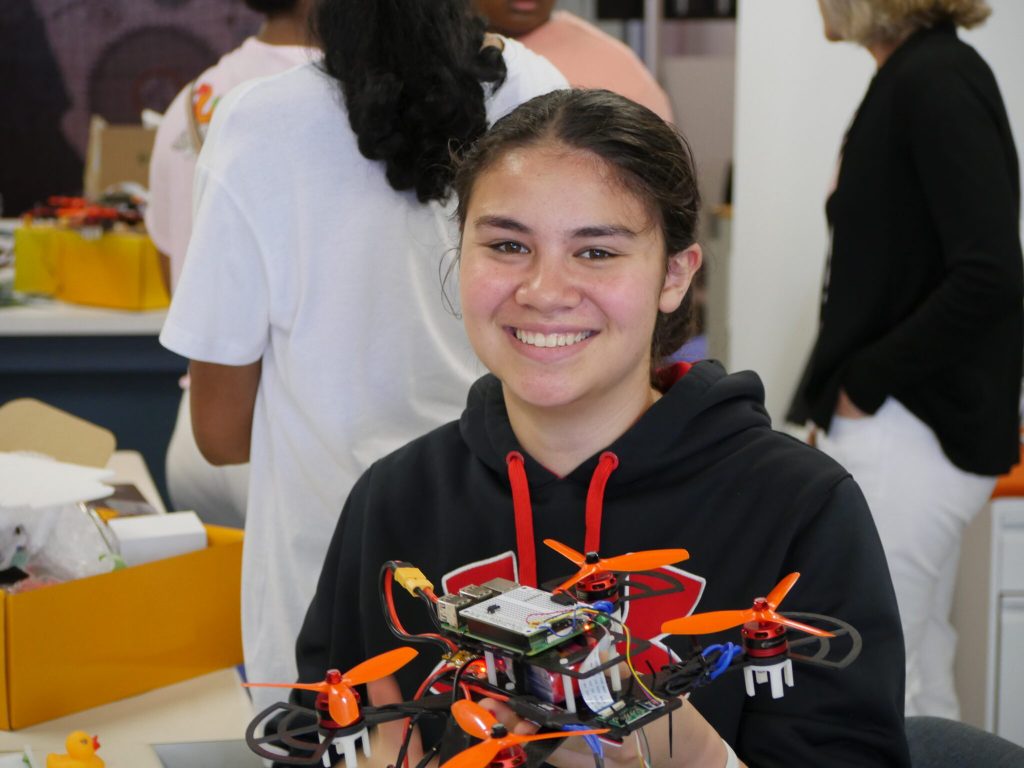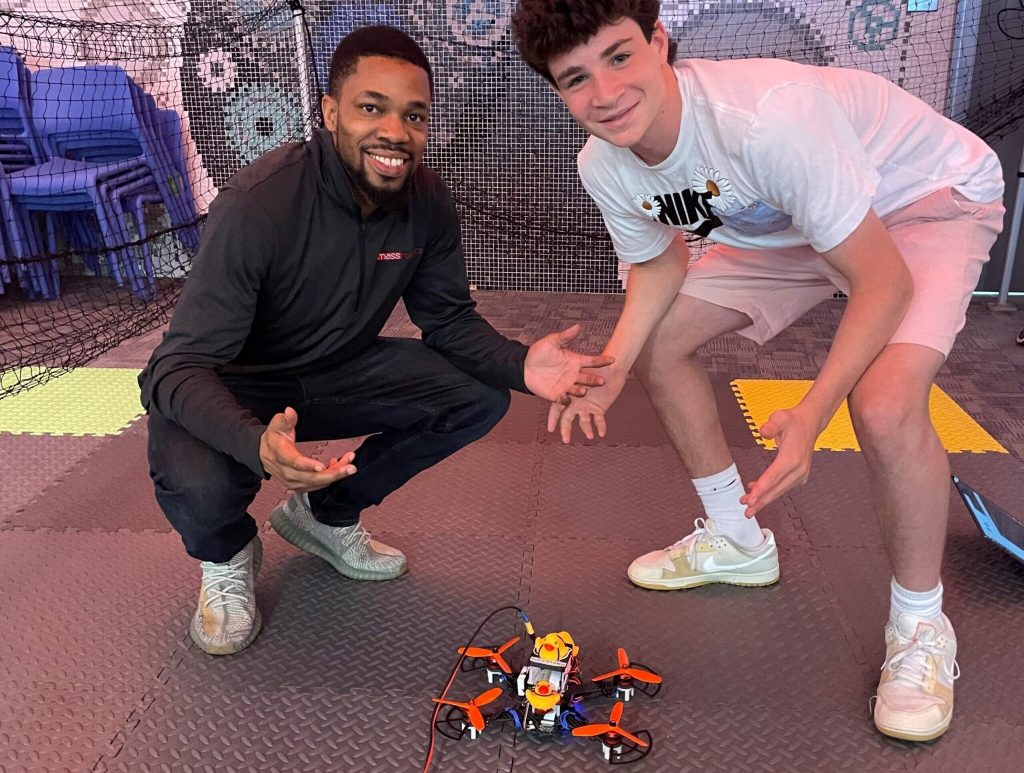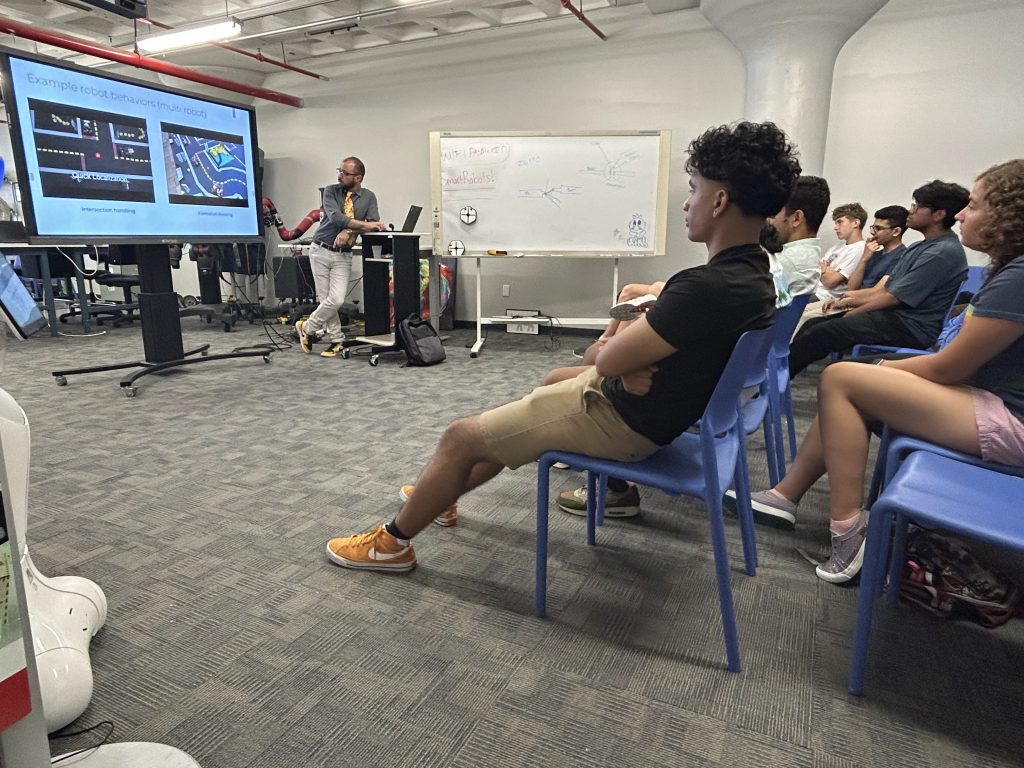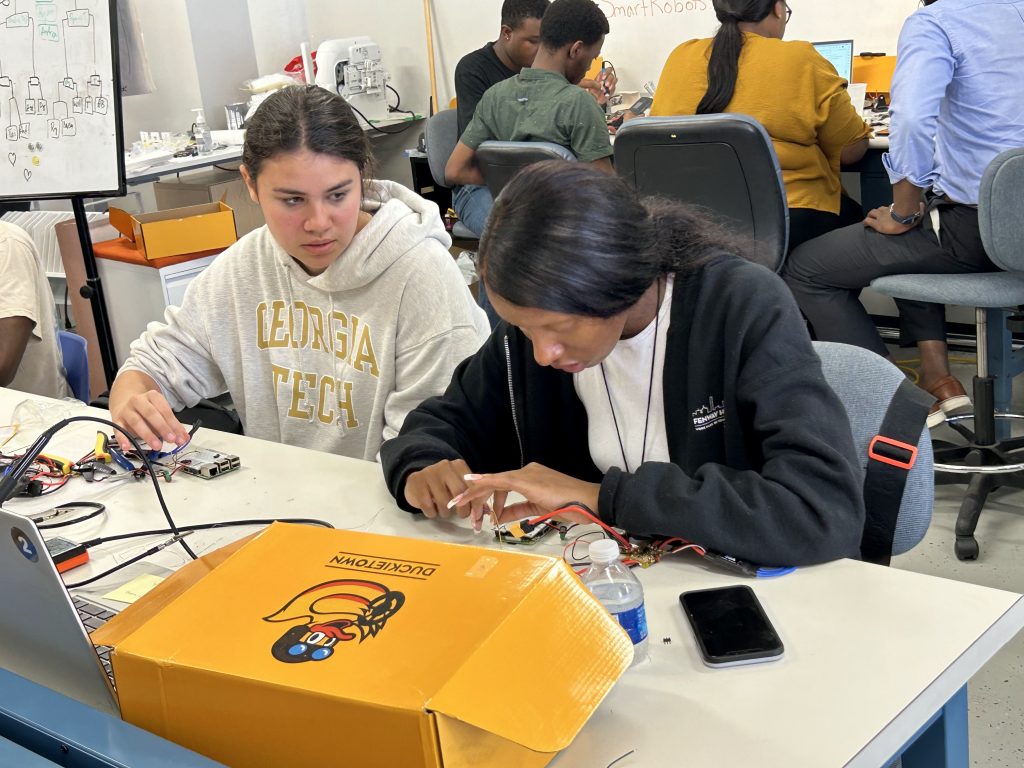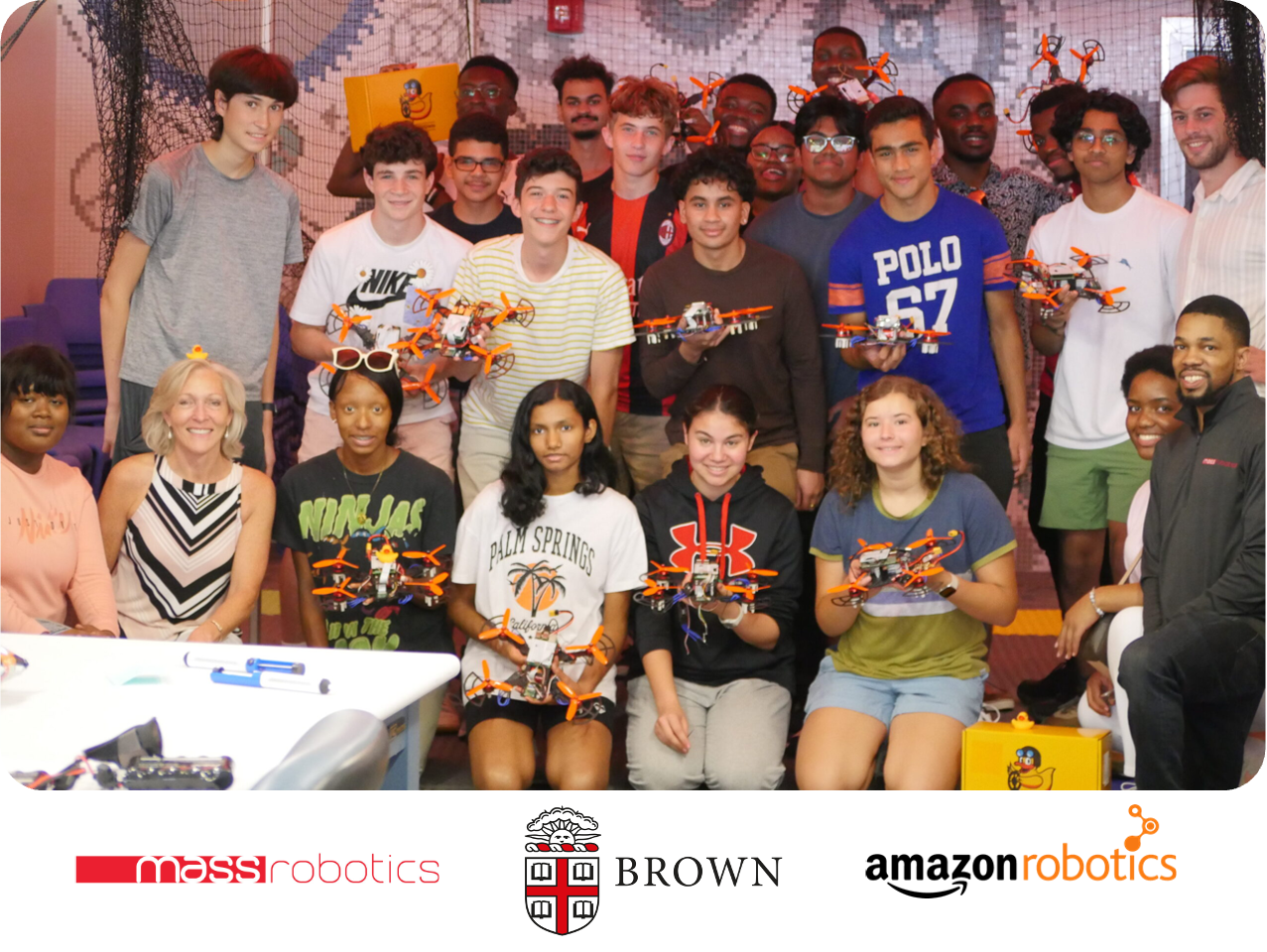
Author: Ivano Marocchi


Shima Akbari graduates with Duckietown at La Sapienza University in Rome
“La Sapienza” University of Rome, April 28, 2023: Shima Akbari, a Ph.D. student at the Italian National Program in Autonomous Systems, shares her experience working with Duckietown for her master’s thesis on lane following control for mobile robots.
Shima's work on control strategies for lane following
Hi, thank you for joining us today. Could you introduce yourself?
Certainly. My name is Shima Akbari, and I have a degree in Control Engineering from “La Sapienza” University of Rome. Currently, I am a Ph.D. student in the Italian National Program in Autonomous Systems.
You recently obtained your master’s degree, congratulations! You worked on lane following control approaches for mobile robots using Duckietown. How did you discover Duckietown?
I first learned about Duckietown while working on my master’s thesis. I have always been passionate about control and autonomy, particularly in mobile robots. However, I didn’t want to limit my project to theoretical calculations or computer simulations. I wanted to have a practical component to my work. When I shared this with my supervisor, Professor Oriolo, he introduced me to Duckietown and suggested that I conduct my experiments in this environment. So I implemented the lane following control in the Duckietown environment as part of my master’s thesis, using both the Duckietown simulator called Duckietown Gym, and the Duckiebots, which are the robots used in Duckietown. I thoroughly enjoyed every minute of conducting my tests.
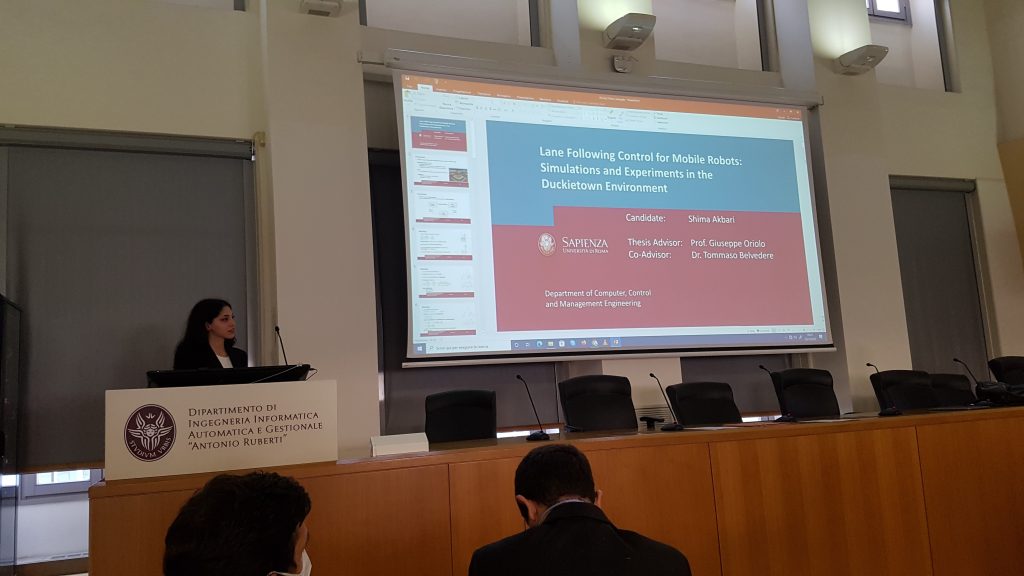
It’s great to hear you enjoyed working with Duckiebots! Tell us a little more about your project and what was your experience like.
My thesis focus was on computer vision based control. I used OpenCV, the well known computer vision library, and the camera mounted on the Duckiebots to extract lane lines from the streets in Duckietown. Based on information extracted from these features, I implemented control laws that enabled the Duckiebot to drive on the streets inside lanes.
To familiarize myself with the platform, I started by taking the Duckietown massive open online course on edX and completed the assignments and homework on my own. One of the modules was about implementing a PID controller for lateral position and another on steering rate control. I enjoyed the Braitenberg vehicles activity too, but my favorite project was on obstacle avoidance, obstacle detection, and computer vision.
"In engineering, true learning comes from practical implementation, and Duckietown offers that opportunity effectively."
Shima Akbari
You are studying in a field that is statistically dominated by male presence. What are your thoughts on this?
It’s indeed the case. According to recent statistics, only 16% of women are in engineering compared to 84% of men. While I acknowledge this disparity, I believe that women are just as capable as men in engineering or any other field. Moreover, I think that the situation is improving over time. If we look at statistics from 10 to 20 years ago, the percentage of women in engineering was even lower.
What would you say to a young woman who wants to study engineering and may be discouraged by the statistics?
I would tell her that statistics and other people’s opinions should not deter her from pursuing her interest in engineering or any other subject. She should follow her dreams and not be discouraged by external factors.
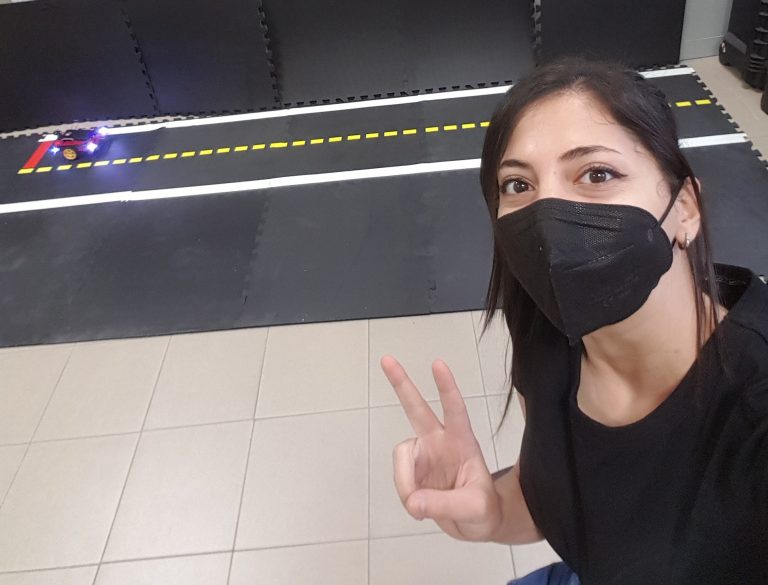
Thank you for this thought, we hope this interview will help it reach as many women thinking about pursuing engineering careers out there as possible.
Absolutely. I would recommend Duckietown to anyone interested in learning about autonomous systems, regardless of their background or gender. It provides an excellent opportunity to learn about autonomy and control in a practical and user-friendly way. In engineering, true learning comes from practical implementation, and Duckietown offers that opportunity effectively.
What would you consider to be the unique value or appeal of Duckietown? What makes it special?
I would say that the simplicity of Duckietown is its most appealing aspect. The robots are designed to be simple and easy to use, and working with them is a lot of fun. Additionally, Duckietown has excellent support, with comprehensive documentation and manuals that are written in a detailed, step-by-step manner. Even if you don’t have a strong background in tools like Linux or Docker, you can still make progress by reading and following the documentation
"Duckietown is simple and has excellent support, with comprehensive documentation and manuals that are written in a detailed, step-by-step manner. Even if you don't have a strong background in concepts like Linux or Docker, you can still make progress by reading and following the documentation."
Shima Akbari
Thank you very much for taking the time to share your experience with us, we really appreciate it. Is there anything else you would like to add?
I’d just like to express how amazing it was for me to be introduced to and work with Duckietown. I would highly recommend it to others as well.
Learn more about Duckietown
The Duckietown platform enables state-of-the-art robotics and AI learning experiences.
It is designed to help teach, learn, and do research: from exploring the fundamentals of computer science and automation to pushing the boundaries of human knowledge.
Tell us your story
Are you an instructor, learner, researcher or professional with a Duckietown story to tell? Reach out to us!

University of Nevada: Professor Lei Yang uses Duckietown based RET
University of Reno, March 7, 2023: Lei Yang, Associate Professor in the Department of Computer Science and Engineering of the University of Nevada in Reno shares with us his experience conducting a program called Research Experience for Teachers (RET) focused on “Integrating Big Data into Robotics”.
Professor Lei Yang tells us about conducting a Duckietown based Research Experience for Teachers
Professor Lei Yang shares with us his relationship with Duckietown and how it performed used in a K-12 teachers research experience led by the Computer Science and Engineering department of the University of Nevada in Reno.
Good morning Professor and thank you for finding the time to speak to me.
Good morning, thank you.
How did you come across Duckietown the first time? When did you discover it?
Well, we needed a specific platform for our project, and a collaborator from Europe told us about this platform he was very familiar with. He let us know that it was a great platform, and that we should have a look at it. We accepted and ended up using Duckietown and suiting it to our project.

Could you tell us more about this project?
For three years now at the University of Nevada, Reno’s Computer Science and Engineering department (CSE) we’ve been conducting a program called Research Experience for Teachers (RET) focused on “Integrating Big Data into Robotics”. It’s a six-week course, through which participants can gain hands-on robotics experience that can be later applied in classrooms, in a fun way. The main idea is trying to provide a research experience to K-12 teachers. That’s why we proposed the idea of using Duckietown to teach K-12 teachers. We asked ourselves. what is the state of the art in terms of data analytics, machine learning? I think Duckietown is a very good education platform for teachers. We make use of the very good materials provided by Duckietown and I’m very satisfied with its implementation.
We purchased a Duckietown set for each participant and let them bring the hardware back to their school. Some teachers started their very own robotics clubs! They basically utilize that as an additional platform for their students.

What would you say are the characteristics of Duckietown that make it useful for you?
Our RET program involves all K-12 teachers, and one of the main goals of our program is to work with these teachers to develop curriculum modules suitable for their students. We have teachers from different levels, but we find that actually middle school and high school teachers are kind of more suited for this program. Duckietown is freely available and includes curricula that can be adapted for all levels of education. It is tangible, it is accessible, and looks fun!
"I think Duckietown is a very good education platform for teachers. We make use of the very good materials provided by Duckietown and I’m very satisfied with its implementation."
Prof. Lei Yang
It’s also easy to deal with. We can find all the materials online, and it is hands-on as I already mentioned. People like hands on activities, it’s good for kids. The duckies also serve to present robotics as less intimidating, making it easier to teach the harder, underlying concepts. I think that’s very nice: it can be used to teach optimization, control theory, these are fundamental things. I think this is a platform that can suit people with different levels of background and also an easy way to start one’s journey into robotics.

What does the future hold?
I think we’ve done a great job this year, and the teachers liked our project. I can see a significant improvement compared to the first year. This is a three-year project, so this year was the last for the program. After the program expired, we submitted another proposal to continue utilizing Duckietown, and to integrate new things like blockchain technology and other new ideas into this program so hopefully we’ll be using this platform in the future as well.
Learn more about Duckietown
The Duckietown platform enables state-of-the-art robotics and AI learning experiences.
It is designed to help teach, learn, and do research: from exploring the fundamentals of computer science and automation to pushing the boundaries of human knowledge.
Tell us your story
Are you an instructor, learner, researcher or professional with a Duckietown story to tell? Reach out to us!

How Duckietown set “Frank” Chude Qian on the path to autonomous vehicles
University of Toronto, February 3, 2022: “Frank” Chude Qian, A Master Student at the University of Toronto, shares with us his experience with Duckietown.
How Duckietown set Chude (Frank) Qian on the road to autonomous vehicles
“Frank” Chude Qian is a Master’s student at the University of Toronto. He first encountered Duckietown at the International Conference on Robotics and Automation (ICRA) in 2019, and from that moment he decided that autonomous vehicles would have been his path forward.

Hello and thank you so much for having accepted to have this brief chat with us! Tell us about yourself and what you do.
Definitely! My name is Frank, and I’m currently a student at the University of Toronto. I’m in the second year of my program. I started as an Engineering Master’s student, and then I switched over to a Master of Science. My main focus is on developing the second generation of the University of Toronto’s autonomous vehicles that participate in the SAE Auto Drive Challenge. My work will end with the transition to the new vehicle, which will happen next year.
Thank you. Could you describe to us your first approach with Duckietown?
Yeah, definitely. So I was actually at ICRA 2019 wandering around and figuring out what to do with my life. I was taking part in another competition where I saw the Duckietown setup at the ICRA challenge [AI-DO 2]. It looked like great fun, I really loved the idea of how the project is and how it’s designed as a global initiative. You have people from different parts of the world trying to do the same thing, which I found inspiring.
Compared to the actual large-scale autonomous vehicles, Duckietown is an affordable option to learn mobility, and I really liked it. After I came back from ICRA, I just started looking at Duckietown and the AI Driving Olympics competition in more detail.

Nice! And how did that go?
In 2019, I started looking into what we could do with Duckiebots at my at Case Western Reserve University, where I was doing my undergrad studies. After learning about the AI-DO challenges, I was like, well, I’ll give it a try! It’s a challenge. I’m pretty competitive. So it took some trying and it ended up, I would say, good enough for where I was back then.
The other thing I looked into was Duckietown’s large code base for demonstrations because I was mainly working on answering the question: “what can you do with limited computing power for a system?”. I tested out the demos, and the Autolab idea, and tried to work on some improvements.
Back in 2019, there wasn’t a lot of work being done on that, unfortunately, but a good part of what was available had been tested, and the documentation was well-proofread. I then took over as a team lead for University of Toronto’s Autonomous Vehicle team, a role less involved with the project, but I still used Duckietown as a great introduction idea, of course.
We have a lot of students who are joining our team with almost no background in autonomous driving, and the Duckietown materials serve as a very good introduction idea to basically educate the younger students on the concept of autonomous vehicles.
Another thing I must say I learned a lot from is the Duckietown challenge and the evaluation side of the AI Driving Olympics, the evaluation server, and the idea of automated evaluation. I think I really gained a lot of experience and knowledge in testing and evaluating thanks to the Duckietown project.
Also along the way, I did another course project on a new baseline for the AI Driving Olympics or for what we call the conditional behavior cloning baseline. So that became another cross-project.
"It’s not only the cost-effectiveness but also the scalability of Duckietown and the potential it has to make a difference in key industrial sectors of the future."
"Frank" Chude Qian
It is great to hear that Duckietown helped you get comfortable with real self-driving cars. Is there anything else you would like to add?
Actually, yes. I know Duckietown is also planning on expanding its materials to the K-12 education side of things. I think that’s a great idea to get more students and younger folks excited about autonomous vehicles. And I think that one day autonomous vehicles will be more and more popular on the road, and the job market for developing and maintaining autonomous vehicles is going to be huge.
I really like the effort, and in fact, that’s probably something I’ll try to do: once I graduate from my current program, I’ll try to hop back on and further the development effort of expanding it to K-12 education.

Would you recommend Duckietown to students or colleagues?
Yeah, definitely! And I want to even sort of move it a step further.: for those students who want to get into autonomous vehicle research or development, but maybe their university doesn’t have much funding support for these kinds of programs, Duckietown is such a great project to just adopt.
You just start with the initial concept, and I’ve seen amazing research done thanks to Duckietown. I personally tried a couple of ideas, too. The one thing Duckietown can provide that nothing else can, as far as I can tell, at the same cost range is the development of multi-robot collaboration and the swarm robotics idea.
I think both of these features just provide great advantages for researchers and for students. You know, it’s a Jetson Nano plus some hardware. Or you can use the Raspberry Pi version. I think for students in the universities which don’t provide as much funding this could be a great starting point. And I personally learned so much throughout those projects, and ultimately that lead me to where I am today. So, yeah, definitely I would recommend it.
What would you say is the biggest quality of Duckietown?
I think from my experience with the AI-DO, it’s not only the cost effectiveness, but also the scalability of Duckietown and the potential it has to make a difference in key industrial sectors of the future.
Thank you very much!
Note from the editors: a few months after this interview, Frank started working as Software Simulation Developer at General Motors. Congratulations, Frank!
Learn more about Duckietown
The Duckietown platform enables state-of-the-art robotics and AI learning experiences.
It is designed to help teach, learn, and do research: from exploring the fundamentals of computer science and automation to pushing the boundaries of human knowledge.
Tell us your story
Are you an instructor, learner, researcher or professional with a Duckietown story to tell? Reach out to us!

University of Nevada doing IoT with Duckietown
University of Nevada doing IoT with Duckietown
Here’s an extract from Nevada Today’s article “Integrating big data into robotics with Duckietown”, written by Kaeli Britt.
For the third year, the University of Nevada, Reno’s Computer Science & Engineering (CSE) department conducted a Research Experience for Teachers (RET) program focused on “Integrating Big Data into Robotics.”
Through the six-week program, participants were able to gain hands-on robotics experience that can be applied in classrooms later, in a fun, nontraditional way.
Duckietown, an engineering and robotics/artificial intelligence (AI) project, focuses on accessible and engaging styles of learning. The project started at the Massachusetts Institute of Technology in 2016 as a graduate class, where they created a video “Duckumentary” highlighting the background and purpose of the research project but also its adaptability for varying age groups.
This year’s University project was taught by Ph. D. candidate and instructor Amirhesam Yazdi as well as CSE associate professor and principal investigator Lei Yang.
Participants were able to learn how to assemble the robots, build and design the track, and program the robots and the track.
“Duckietown is a freely available robotics platform and curricula for all levels of education. It is tangible, accessible, and fun. It has mobile robots and roads, constructed from exercise mats and tape,” Yang said. “The mobile robots are built from off-the-shelf parts and using open-source software and the curricula, such as lectures and exercises are provided on the Duckietown website. These unique features set Duckietown apart from other engineering, robotics and/or AI projects.”

Tell us your story
Are you an instructor, learner, researcher or professional with a Duckietown story to tell? Reach out to us!

Introduction to robotics at the University of Massachusetts Lowell using Duckietown
University of Massachusetts, Lowell, December 20, 2022: Paul Robinette, Assistant Professor at the University of Massachusetts Lowell (UML), shares with us his Duckietown teaching experience.
Introduction to robotics at the University of Massachusetts Lowell using Duckietown

Thank you for finding the time to talk with us! Could you introduce yourself?
My name is Paul Robinette [Linkedin] and I’m a Professor of computer engineering at the University of Massachusetts Lowell [website].
When was your first experience with Duckietown?
My first experience with Duckietown would have been when I worked at MIT as a research scientist, just after Duckietown was run. I didn’t have a chance to see it live there, but I did talk with several of the postdocs who worked on it as it ran. I also saw it live for the first time at ICRA 2019.


Do you use Duckietown or did you use Duckietown in the past for some specific project or activity?
Sure! For the last three years, I’ve been using Duckietown robots in my class every semester. Primarily I use the Duckiebots to teach ROS and basic robot skills through the Duckietown system and infrastructure. I leverage the development infrastructure heavily and some of the course materials as well.
That sounds great! Can you tell us more about your ongoing class?
The class I teach every semester so far is called Fundamentals of Robotics [2022 class page], and we go over the basics of robotics, starting with multi-agent processing or multi-process systems, like most robots are these days, some basic networking problems, etc. The Duckiebots are perfect for that because they have Docker containers on board which have multiple different networks running. They have to work with the computer system, so it’s always at least interfacing with the laptop. The robots can be used with a laptop, with a router, you can have multiple robots out at once, and they give the students a really good sense of what moving real robots around feels like. We have students start by implementing some open loop control systems, then have them design their own lane detector, similar to the Duckietown [perception] demo, and then have them design their own lane controller again, similar to the Duckietown [lane following] demo.

Are your students appreciating using Duckietown? Would you consider it a success?
Yes, especially the newer version. The DB21s are great robots for using their class applications and infrastructure. The software infrastructure has made it pretty easy to set up our own Git repositories for the robots and be able to run them. In this way, students can run them at home or on campus.
Would you suggest Duckietown to your students or colleagues?
Yes, I’d suggest Duckietown, especially if people want to run an introductory robotics class and have every student purchase their own robot, or have the University provide the robots for all. Duckietown is much more affordable than any other robot system that could be used for this same purpose.
"In my class we go over the basics of robotics, starting with multi-agent processing or multi-process systems, like most robots are these days, and the Duckiebots are perfect for that"
Prof. Paul Robinette
It is great to hear Duckietown addresses your needs so well. What would you say is the advantage that Duckietown has when compared to other systems?
I’d say the expense is probably the biggest advantage right now. It’s a nice platform and very capable for what we wanted to do. At this point, the fact that it’s affordable for students to purchase on their own or for us to purchase a bunch of them is definitely the biggest advantage for us. You guys also have a really quick response time if we have any problems. It’s nice to be able to talk directly with the development team and work with them to set up the systems so that I can run them in my class as I need to.
Thank you very much for your time!
Learn more about Duckietown
The Duckietown platform enables state-of-the-art robotics and AI learning experiences.
It is designed to teach, learn, and do research: from exploring the fundamentals of computer science and automation to pushing the boundaries of knowledge.
Tell us your story
Are you an instructor, learner, researcher or professional with a Duckietown story to tell? Reach out to us!

Join the new “Self-Driving Cars with Duckietown” MOOC
Join the self-driving cars with Duckietown MOOC user-paced edition
Over 7200 learners engaged in a robotics and AI learning adventure with “Self-Driving Cars with Duckietown”, the first massive online open course (MOOC) on robot autonomy with hardware, hosted on the edX platform.
Kicking off on November 29th, this new edition is a user-paced course with rich and engaging modules offering a grand tour of real-world robotics, from computer vision to perception, planning, modeling, control, and machine learning, released all at once!
With simulation and real-world learning activities, learners can touch with hand the emergence of autonomy in their robotic agents with approaches of increasing complexity, from Brateinberg vehicles to deep learning applications.
We are thrilled to welcome you to the start of the second edition of Self-Driving Cars with Duckietown.
This is a new learning experience in many different ways, for both you and us. While the course is self-paced, the instructors and staff, as well as your peer learners and the community of those that came before you are standing behind, ready to intervene and support your efforts at any time.
Learn autonomy hands-on by making real robots take their own decisions and accomplish broadly defined tasks. Step by step from the theory, to the implementation, to the deployment in simulation as well as on Duckiebots.
Leverage the power of the NVIDIA Jetson Nano-powered Duckiebot to see your algorithms come to life!
MOOC Factsheet
- Name: Self-driving cars with Duckietown
- Platform: edX
- Cost: free to attend
- Instructors: Swiss Federal Institute of Technology in Zurich (ETHZ), Université de Montréal (UdM), Toyota Technological Institute at Chicago (TTIC)
Prerequisites
- Basic Linux, Python, Git
- Elements of linear algebra, probability, calculus
- Elements of kinematics, dynamics
- Computer with native Ubuntu installation
- Broadband internet connection
What you will learn
- Computer Vision
- Robot operations
- Object Detection
- Onboard localization
- Robot Control
- Planning
- Reinforcement Learning

The Duckietown robotic ecosystem was created at the MIT Computer Science and Artificial Intelligence Laboratory (CSAIL) in 2016 and is now used in over 175 universities worldwide.
“The Duckietown educational platform provides a hands-on, scaled-down, accessible version of real-world autonomous systems.” said Emilio Frazzoli, Professor of Dynamic Systems and Control, ETH Zurich, “Integrating NVIDIA’s Jetson Nano power in Duckietown enables unprecedented access to state-of-the-art compute solutions for learning autonomy.”



Enroll now and don’t miss the chance to join in the first vehicle autonomy MOOC with hands-on learning!


The Duckietown path to robotics: an interview with Prof. Francesco Maurelli
Jacobs University, Bremen, June 1, 2022: Francesco Maurelli, professor at the Jacobs University of Bremen, talks about how Duckietown impacted his work and his academic career.
The Duckietown path to robotics: an interview with Prof. Francesco Maurelli
Francesco Maurelli, professor at the Jacobs University of Bremen, Germany, shares in the interview below his interaction with Duckietown.

Let’s start by simply asking your name, who you are, where you work, what you do for a living.
Hi, Federico. Hi, everyone. I am Francesco Maurelli and I’m a professor in robotics at Jacobs University in Bremen.
When was the first time you came across Duckietown in your life? Describe your first contact with Duckietown for us.
Well, that was in my team. I was there as a Marie Curie scholar from Europe. I met Andrea and Liam, and learned about this new initiative. I was interested so I spoke in depth with them and with the students who took the course. I then looked at the videos and thought it was a great setup because it brings robotics closer to the students in a fun way by reducing the access barrier. Many people think that robotics is very hard, which is true. I’m not saying it’s easy, but on the other hand, there are easier paths to access robotics. Additionally the element of gamification makes people happy when they work with Duckietown. I found that students want to get involved regardless of the course work, they just like the concept.


Thank you. Is there a specific thing that maybe you did using Duckietown in your life, a project, a program or some sort of ecosystem?
We have had three different initiatives based on Duckietown.
The first one, called Jacobs Robotics, was an extracurricular activity for students. I would meet interested students outside of class time, it wasn’t linked to academic credit. It was just for fun and for learning. Among the different robotics platforms, we had a group working on Duckietown. This was the initial step in using Duckietown at our university.
Then the second step was to embed Duckietown in the official curriculum. We have a bachelor’s program in robotics and intelligence systems, and I’m its program manager. We were rewriting and updating some parts of it as we underwent a new wave of accreditation. So I took the opportunity to redesign some aspects of the program and in this process decided to embed Duckietown at Bachelor level. I’ve introduced it at Ross Lab in simulation in the fall of the second year, in the third semester, and then we have a robotics project based on Duckietown in the spring, ofthe second year, (i.e. in the fourth semester). That means that when students start their third year, they already have an understanding of ROS, they have knowledge of Duckietown and they work with real systems. This means that they can do a much better thesis, even if it’s a Bachelor level, we can improve the average level. When I joined the University, the first month of the thesis was lost on students learning to use Ross, for example. Now we are a step ahead.

The third part is the research application. It’s not only a matter of having fun with students, or delivering courses to students, but also doing my own research. I have a project which is funded by the German Research Foundation, DFG, it is in collaboration with the psychology Department. The psychologists want to look at the characteristics that humans assign to entities to identify the “self”. We as roboticists are going to develop and program different robotic behaviors, which the behavioral scientist from the psychology department will analyze. In a nutshell, we will prepare different videos illustrating the same actions performed in different ways. A very basic example would be moving in a city at constant speed or moving in a city at variable speeds. Our partners in the psychology department will show these videos to the study participants and collect user feedback through questionnaires to determine which behaviors they think are more alike a self determined behavior.
This is extremely interesting. Thank you very much. Have you ever heard about the MOOC course?
Yes, actually. In fact I suggested to our students to look at the MOOC. Of course, it is set up in a different way with respect to our course, but it can be and it has been a useful tool for students to review some of the material through a different viewpoint. So it’s definitely a valuable learning material which is available to the community.
"It's not only a matter of having fun with students, or delivering courses to students, but also doing my own research."
Francesco Maurelli
Okay. My last question is would you suggest Duckietown to other people, colleagues or your students? And why?
Absolutely. I see that from my own experience, students like it and they learn a lot about robotics. All the different concepts ranging from control to localization to computer vision can be applied in Duckietown. So in our projects, in our robotics projects, different groups of students develop different ideas. And I see that they are enjoying themselves and they are learning. So it’s definitely a plus.
Thank you very much.
Learn more about Duckietown
The Duckietown platform offers robotics and AI learning experiences.
Duckietown is modular, customizable and state-of-the-art. It is designed to teach, learn, and do research: from exploring the fundamentals of computer science and automation to pushing the boundaries of knowledge.
Tell us your story
Are you an instructor, learner, researcher or professional with a Duckietown story to tell? Reach out to us!

When rubber duckies meet the road: an interview with Prof. Liam Paull
UdM, Montréal, May 5, 2022: Liam Paull, professor at the University of Montreal and one of Duckietown’s founders, talks about his role and experiences with Duckietown.
When rubber duckies meet the road: an interview with Prof. Liam Paull
Liam Paull, professor at the University of Montreal in Quebec, and one of the very founders of Duckietown, shares below his unique perspective about Duckietown’s journey and its origin.

Good morning, Liam.
Hello.
Thank you very much for accepting to have this little chat.
Could you tell us something about you?
Sure. So my name is Liam Paull. I’m a professor at the University of Montreal in Quebec, Canada. I teach in the computer science Department, And I do research on robotics.
Ok and when was the first time you “came across” Duckietown?
Well, I’m actually one of the creators of Duckietown, So I didn’t come across it as much! The origin story of Duckietown is kind of interesting, But I probably forgot some of the details. It must have been about 2015. And myself, Andrea Censi, and a few others were interested to get more teaching experience. We were all postdocs or research scientists at MIT at the time. I guess we started brainstorming ideas, and then roughly around that time, I switched positions at MIT. I was previously a postdoc in John Leonard’s group working on marine robotics, and then I switched to become part of Danielle Lerous lab and lead an autonomous driving project. And so somehow the stars just aligned. That the right topic for this class that we would teach would be autonomous driving. Yeah, the Ducky thing is kind of a separate thing. Actually, Andrea had started this other thing that was making videos for people to publicize their work at a top robotics conference Called the international conference robotics automation, and somehow had the idea that every single video that was submitted should have a rubber Ducky in it. And this was for scale or something.
There was some kind of reason behind it I sort of forget. But anyway, so the branding kind of caught fire.
When we were building the class, we agreed the one constraint was that there should be duckies involved somehow, and the rest is kind of history!

"I believe that there's a lot of interesting research directions that come from a standardized, small scale, accessible autonomous driving platform like Duckietown."
Liam Paull
Anything else you would like to add about Duckietown and it’s uses?
I didn’t mention specifically about the MOOC. One of the core missions of this project from the onset has been that it’s accessible. Both in terms of hardware but also in terms of software. And part of what that means to us Is that no matter where you are, no matter who you are, you should be able to get the hardware and you should be able to use the educational resources to learn. And part of the motivation for that Was that we saw that while we were at MIT. When you’re at a place like MIT you are extremely privileged and if you come from a background of less privilege, you see the discrepancy. In some sense, it’s palpable. Part of that, I guess, was that we don’t even necessarily want it to be a prerequisite that students should be enrolled in universities in order to be able to address the platform. So we built this massive online open source course through edx, which is also an open source provider Where people can, regardless of their background or regardless of their situation, they can sign up for this thing, and it’s a creative set of materials that also have exercises to interact with the robot that anybody can do, Regardless of whether they’re at a University or not.
I think this is the next step for us in making the platform accessible to all, and we’re going to continue to run iterations of this thing. But I also think that this is an exciting objective that very much fits in the mission of what we’re trying to do with this project.
This was great thank you for your time!
Awesome. Great. Thank you for your time. Bye.

Learn more about Duckietown
The Duckietown platform offers robotics and AI learning experiences.
Duckietown is modular, customizable and state-of-the-art. It is designed to teach, learn, and do research: from exploring the fundamentals of computer science and automation to pushing the boundaries of knowledge.
Tell us your story
Are you an instructor, learner, researcher or professional with a Duckietown story to tell? Reach out to us!
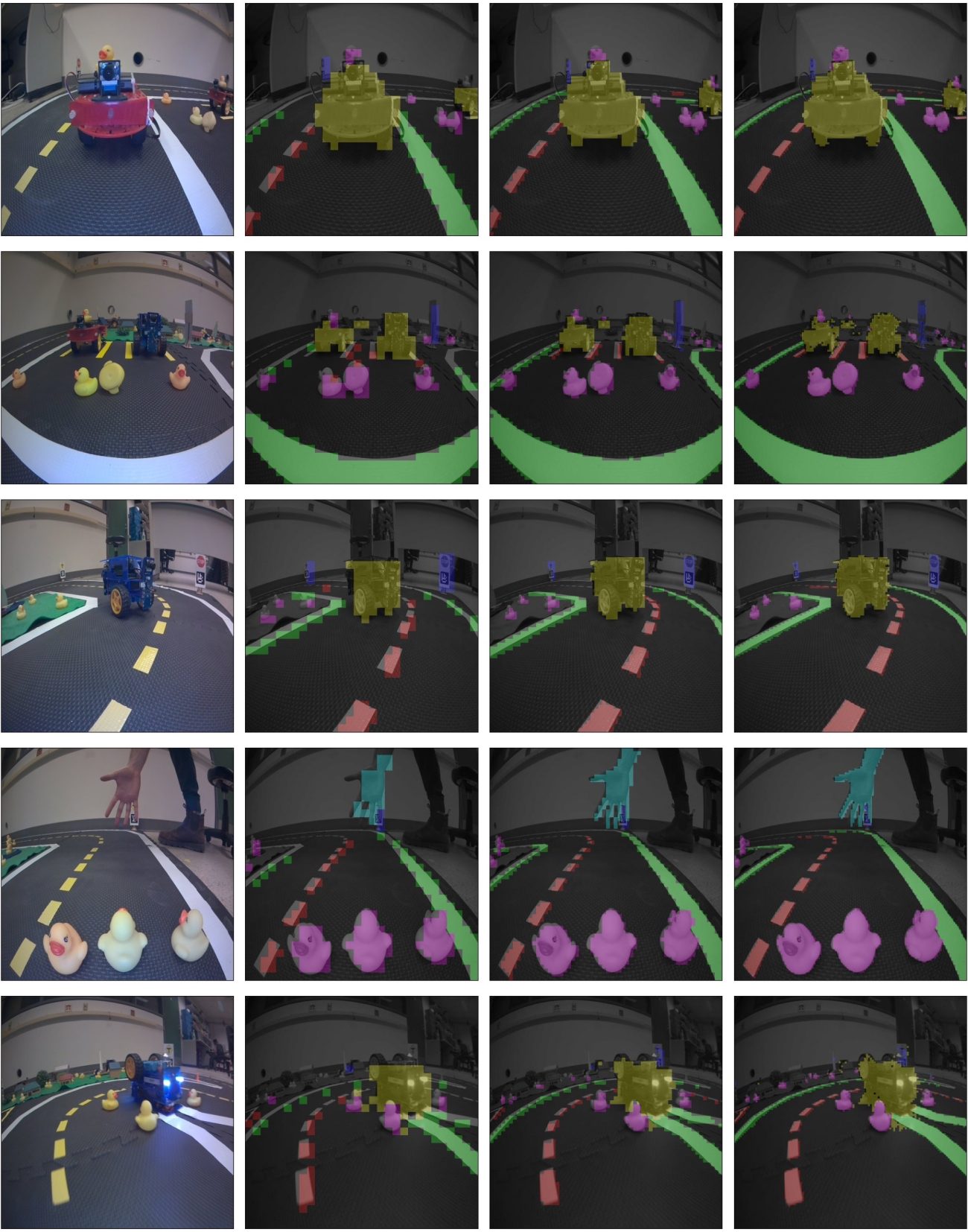
Monocular Robot Navigation with Self-Supervised Pretrained Vision Transformers
Monocular Robot Navigation with Self-Supervised Pre-trained Vision Transformers
Duckietown’s infrastructure is used by researchers worldwide to push the boundaries of knowledge. Of the many outstanding works published, today we’d like to highlight “Monocular Robot Navigation with Self-Supervised Pretrained Vision Transformers” by Saavedra-Ruiz et al. at the University of Montreal.
Using visual transformers (ViT) for understanding their surroundings, Duckiebots are made capable of detecting and avoiding obstacles, while safely driving inside lanes. ViT is an emerging machine vision technique that has its root in Natural Language Processing (NLP) applications. The use of this architecture is recent and promising in Computer Vision. Enjoy the read and don’t forget to reproduce these results on your Duckiebots!
Abstract
“In this work, we consider the problem of learning a perception model for monocular robot navigation using few annotated images. Using a Vision Transformer (ViT) pretrained with a label-free self-supervised method, we successfully train a coarse image segmentation model for the Duckietown environment using 70 training images. Our model performs coarse image segmentation at the 8×8 patch level, and the inference resolution can be adjusted to balance prediction granularity and real-time perception constraints. We study how best to adapt a ViT to our task and environment, and find that some lightweight architectures can yield good single-image segmentations at a usable frame rate, even on CPU. The resulting perception model is used as the backbone for a simple yet robust visual servoing agent, which we deploy on a differential drive mobile robot to perform two tasks: lane following and obstacle avoidance.”
Pipeline
“We propose to train a classifier to predict labels for every 8×8 patch in an image. Our classifier is a fully-connected network which we apply over ViT patch encodings to predict a coarse segmentation mask:”
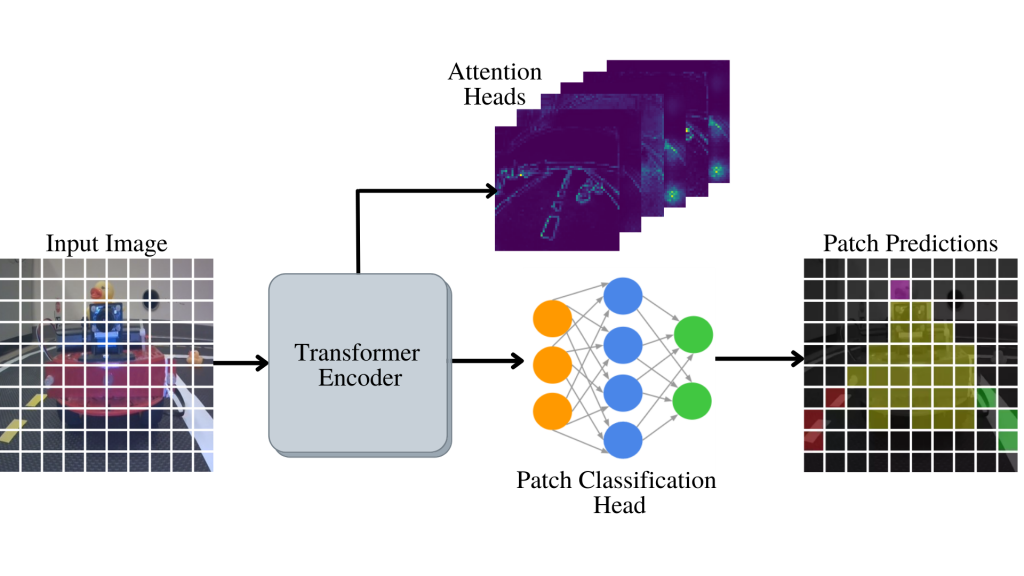
Conclusions
Learn more
The Duckietown platform offers robotics and AI learning experiences.
Duckietown is modular, customizable and state-of-the-art. It is designed to teach, learn, and do research: from exploring the fundamentals of computer science and automation to pushing the boundaries of knowledge.

